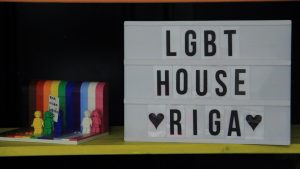 On 31 May 2023, a few days before Riga Pride, the Latvian Parliament elected Edgars Rinkēvičs as President of the country for a 4-year term. The President will take up his new post on 8 July, at which point he will leave his post as Minister of Foreign Affairs, which he has held since 2011 and which has given him definite international cover: after three years at the head of the ministry, the diplomat had come out. At the time, in 2014, he was the first leading Latvian politician to reveal his homosexuality.
On 31 May 2023, a few days before Riga Pride, the Latvian Parliament elected Edgars Rinkēvičs as President of the country for a 4-year term. The President will take up his new post on 8 July, at which point he will leave his post as Minister of Foreign Affairs, which he has held since 2011 and which has given him definite international cover: after three years at the head of the ministry, the diplomat had come out. At the time, in 2014, he was the first leading Latvian politician to reveal his homosexuality.
While local LGBTQIA+ associations are delighted at the increased visibility given to their struggle within society, there is still much progress in equal rights.
“We are still one of the worst countries in the European Union.”
Latvia is at the bottom of the table compared to other EU countries, with an equal rights rate for LGBTQI people of 22%. By comparison, Malta has the highest score (89%, compared with 63% for France). Only Bulgaria, Romania, and Poland have less equal legislation within the EU than Latvia.
That’s why Mozaïka (Mosaic) has set itself the mission of defending the legal situation of LGBTQIA+ people in Latvia. “When we gained independence, homosexuality was still criminalized. Since decriminalization [in 1993], we have finally managed to ensure that more people support or accept LGBT people than disapprove of them (...) But we are still one of the worst countries in the European Union when it comes to the rights of LGBT people. There have been few legislative improvements, and much work remains.”
Walking through the busy shopping streets of Riga, finding the Mozaïka organization is easy. It displays its name and a sticker in rainbow flag colors on its front door. The key word here could be “total transparency.” The glass front door and uncurtained windows mean everything in the main room can be seen from the street.
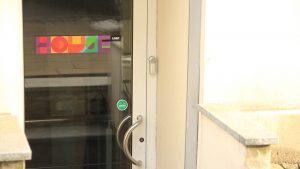
And yet, while this situation may seem natural today, it was far from a foregone conclusion just a few years ago. Mozaïka was founded in 2005 by Kaspars Zālītis and others in response to the violence at Latvia’s first Pride March. A year after the country joined the EU, only 70 people marched through the streets of Riga, with 3,000 opponents booing and insulting them, some of whom threw excrement at the Pride participants. Kaspars notes: “Pride is very political here, even today. It’s about rights. You can see a big party everywhere and often in Western Europe. But here, you’ll still see people like you might have seen at Pride events 30 years ago elsewhere in the world. It’s all very well dancing but, above all, we’re continuing to demand equality.”
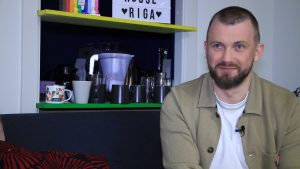
Since its creation, the organization’s missions have expanded, explains Kaspars: “We support victims of discrimination and hate crimes. We monitor online crime and provide legal assistance to LGBT people. (...) We also work in the field of health. For example, we have doctors who come to our premises and volunteers who work at screening points [for sexually transmitted infections, editor’s note].”
It’s tempting to compare the situation between Estonia, Lithuania, and Latvia, as all three countries left the Soviet Union simultaneously and joined the EU in the same year. “In many respects, our three countries are still in the competition. This competition probably doesn’t exist in the field of human rights,” smiles Kaspars mischievously. “As far as Estonia is concerned, it is ahead of us. There is now a ‘competition’ between Latvia and Lithuania. Who will be the first to pass a law on civil partnerships? But the competition is between activists, not politicians,” Kaspars laughs. “So when it comes to LGBT rights, we activists sometimes ask each other if a country can do a bit better. Because, in the end, their success will contribute to ours!”
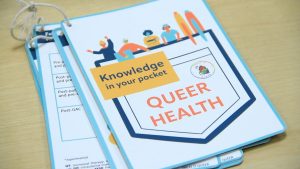
In the Baltic States, the legislative situation for LGBTQIA+ people is least advanced in Latvia. This is why Mozaïka’s activism focuses on recognizing same-sex unions and recognition as a family. The organization’s spokesperson notes the paradoxical situation in the country: “The majority of society is in favor. The majority of businesses are in favor. Many politicians are in favor. The only problem is that we don’t have enough votes in Parliament.”
Even ten years after Foreign Minister E. Rinkēvičs came out and on the eve of his future term as President of the Republic, no new legislation favoring LGBT people has come to fruition. At the end of 2022, the law proposing a civil partnership was once again rejected by Parliament. “It’s frustrating to lose. Nobody is happy to see this happen after four years of hard work trying to persuade society, trying to persuade politicians, trying to persuade different communities, building alliances, and organizing events. It’s very depressing to lose by just three votes in Parliament. But we can’t stop there.”

LGBTQIA+ rights and democracy: two inseparable battles?
Since the end of the USSR more than 30 years ago, the gulf between Russia and the Baltic States has widened steadily as societal reforms have progressed. “The Russian invasion of Ukraine reminded us that we have succeeded greatly. We need to celebrate the freedom we have. We should celebrate the human rights we enjoy. Because just a few hours away, further east, the situation is completely different. And not just in Russia but also in Belarus. What stands out in Russia from the so-called LGBT propaganda law [Russian law of 2013, amplified in 2022, editor’s note] is the oppression of civil society. Just a few hours away, the Iron Curtain is back. And that’s disturbing,” observes K. Zālītis.
The Kremlin’s positioning as the defender of so-called “traditional” values that are allegedly under threat in the West is a language widely used by nationalist and far-right parties in Europe. Latvia is no exception. It permeates the policy of the Latvian national-conservative party Alliance Nationale, a coalition member that has been in power since 2011 (4 ministers out of the 14 that form the government).
The Mozaïka spokesman insists on the paradox of the Latvian situation: “Some politicians, when they speak, use the same words as Putin and Orban, but they don’t want to admit it. When it comes to oppressing certain minority groups, they are absolutely in line with Putin. The only difference is that, in the heart of Latvia’s nationalist party, it’s all about hating Russia and everything to do with it. In their vision, these anti-LGBT politicians have much in common with Putin but don’t want to acknowledge it.”
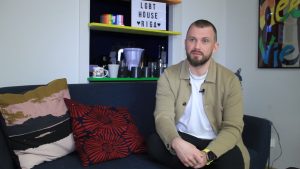 Zālītis notes that the Latvian national-conservative party is not eurosceptic, its representatives being aware of what European funds bring to the country. A situation that can be seen as paradoxical: “We [Latvians] love European funds; we want to be like the rest of the European countries. The only thing some of us don’t want is to adopt its values. And that’s why we’re reminding people that money can’t just arrive. Values and democracy are also part of it. Choosing one or the other is not how it works. European values cannot be summed up as a choice: I like this or that. They have to be embraced as a whole.”
Zālītis notes that the Latvian national-conservative party is not eurosceptic, its representatives being aware of what European funds bring to the country. A situation that can be seen as paradoxical: “We [Latvians] love European funds; we want to be like the rest of the European countries. The only thing some of us don’t want is to adopt its values. And that’s why we’re reminding people that money can’t just arrive. Values and democracy are also part of it. Choosing one or the other is not how it works. European values cannot be summed up as a choice: I like this or that. They have to be embraced as a whole.”
Kaspars remains hopeful: “We can become more European; we just have to get some politicians to be a little more courageous than they are and stop using fear and hatred.”
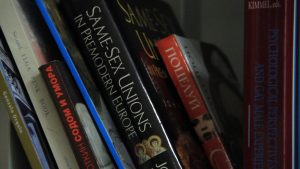
Time for a change?
According to its organizers, Riga Pride 2023 attracted more than 5,000 participants, making it one of the best-attended Pride events in the country’s history. Following the election of the new President, Mozaïka believes that the time has come for concrete change in society.
Kaspars Zālītis says with determination: “What we want to achieve now, very clearly and insistently, is the recognition of same-sex families. That’s what we need. That’s what we’re asking for, and that’s what we want to achieve. That’s what we want. And it’s no longer a request! We demand it now!”
* Michaël Briffaud (text and photos) is a freelance journalist, currently based in Vienna (Austria) and formerly in Washington DC; he works regularly for AFP’s video bureau.
Link to the French version of the article
Translated from French by Assen SLIM (Blog)
